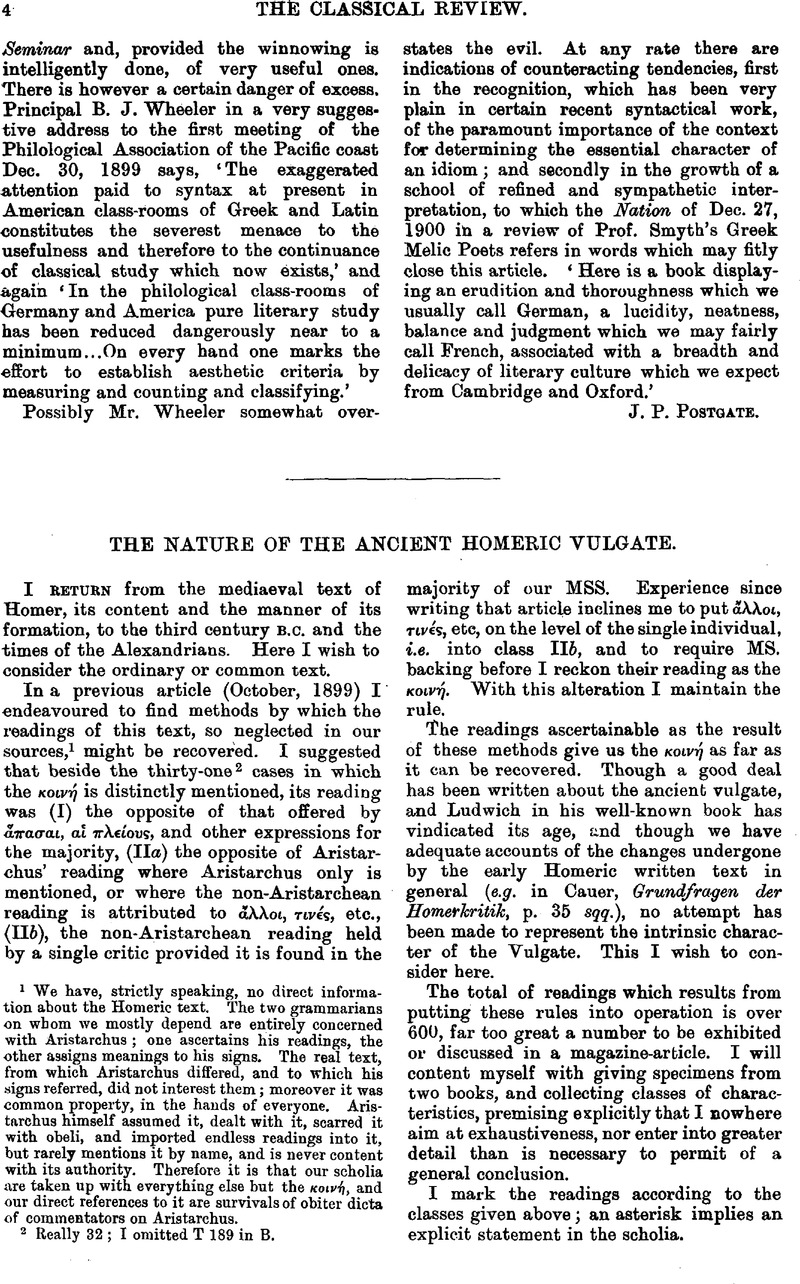No CrossRef data available.
Article contents
The Nature of the Ancient Homeric Vulgate
Published online by Cambridge University Press: 27 October 2009
Abstract

- Type
- Review Article
- Information
- Copyright
- Copyright © The Classical Association 1901
References
page 4 note 1 We have, strictly speaking, no direct information about the Homeric text. The two grammarians on whom we mostly depend are entirely concerned with Aristarchus; one ascertains his readings, the other assigns meanings to his signs. The real text, from which Aristarchus differed, and to which his signs referred, did not interest them; moreover it was common property, in the hands of everyone. Aristarehus himself assumed it, dealt with it, scarred it with obeli, and imported endless readings into it, but rarely mentions it by name, and is never content with its authority. Therefore it is that our scholia are taken up with everything else but the κοιν, and our direct references to it are survivals of obiter dicta of commentators on Aristarchus.
page 4 note 2 Really 32; I omitted T 189 in B.
page 5 note 1 There is some doubt about the tradition.
page 6 note 1 And hence probably come the depreciatory epithets ‘careless,’ ‘inferior,’ ![]() which the grammarians apply to it. They do not imply an inferior source of text, but that the vulgate, or part of the vulgate, had not ‘worn well.’
which the grammarians apply to it. They do not imply an inferior source of text, but that the vulgate, or part of the vulgate, had not ‘worn well.’
page 7 note 1 The same comparison — with printed German classics—has been made by Caner, l.c. p. 35.
page 7 note 2 One particular case of which was recognised by the ancients, who called it μεταχαρακτηρισμς.
page 7 note 3 Wolf, Prol. p. cxlii. sq.; Ritschl, Opuscula, i. 1, sq. (1838); Lehrs, Aristarchus, p. 434, sq. (1862)Google Scholar; Wilamowitz-Möllendorf, Hom. Untersuchungen, 235, sq. (1884); Flach, Peisistratos und seine literarische Thätigkeit (1885); Ludwich, Aristarchs Hom. Textkritik, ii. 390 sq. (1885); Cauer, Grundfragen d. Homerkritik, 80 sq. (1896).
page 8 note 1 This is only Ritschl's account (l.c. p. 50) in other words: ‘Fragt man nun, wie es zugehe, dass auch dieses Textes in der Alexandrinischen Kritik angeblich so selten Erwähnung geschehe, so ist die Behauptung, seiner kritischen Unsicherheit balber sei er keiner sonderlichen Beachtung gewürdigt worden, ein so unbestimmter als willkürlicher Nothbehelf. Vielmehr bildet sich, wenn man sich nach den erhaltenen Andeutangen die kritische Thätigkeit der Alexandriner zu vergegenwärtigen sucht, sofort die Ueberzeugung, dass diese, mitten nnter einem reichen Vorrathe abweichender Ueberlieferungen, von irgend einer Grundlage ausgingen, die ihnen als das Gegebene galt, was durch vergleichende Zuziehung anderer Autoritäten zwar im einzelnen vielfach modificirt werden konnte, für die Anordnung im Ganzen aber als feste Norm betrachtet wurde. Diese Unterlage ihres kritischen Geschäftes war aber, den klärlichsten Anzeigen zufolge, keine andere als der Pisistrateische Text, der gleichsam die Vulgata geworden war. Die Nothwendigkeit stets wiederholter namentlicher Anführung würde nun schon dadurch wegfallen, dass eben jenes Verhältniss die allgemeine Voraussetzung war, worauf alle Ausübung Homerischer Kritik beruhte, und worüber eine ausdrückliche Verständigung niemand begehrte oder nöthig hatte.’
page 9 note 1 The tone of these passages—dissatisfaction with the κοιν as an authority, and search for some personal source beyond it—way temper our surprise at one extraordinary seholion. Γ 406  codd.) A true grammarian's utterance, whether it is Aristarchus or Didymus that speaks. No ‘decent’ edition had the reading, and the grammarian cannot think how it ‘got i n’ to the κοιν. It was always there. The other reading started in some eccentric edition, and all the μέτριοι, Antimachus, Euripides, Philetas, Rhianus, vrais moutons de Panurge, copied it.
codd.) A true grammarian's utterance, whether it is Aristarchus or Didymus that speaks. No ‘decent’ edition had the reading, and the grammarian cannot think how it ‘got i n’ to the κοιν. It was always there. The other reading started in some eccentric edition, and all the μέτριοι, Antimachus, Euripides, Philetas, Rhianus, vrais moutons de Panurge, copied it.
Similarly A 97 the grammarian will not rest with the vulgate as the authority for the anti-Aristarchean reading: he will ‘give it a name,’ ![]() . A 455 Didymus makes a shot at schoolmasters, γραμματιστα, as the originators of the vulgate: γ 269–273 he divines sophists behind the text, Γ 18 he expresses simple surprise that the reading, not Aristarchus', has merits:
. A 455 Didymus makes a shot at schoolmasters, γραμματιστα, as the originators of the vulgate: γ 269–273 he divines sophists behind the text, Γ 18 he expresses simple surprise that the reading, not Aristarchus', has merits: ![]() .
.
page 9 note 2 The story also as believed in antiquity implies that the line was usually if not always read, no less than the other lines which schol. B quotes (836, 868: schol. on B 494) as having decided similar political cases.




